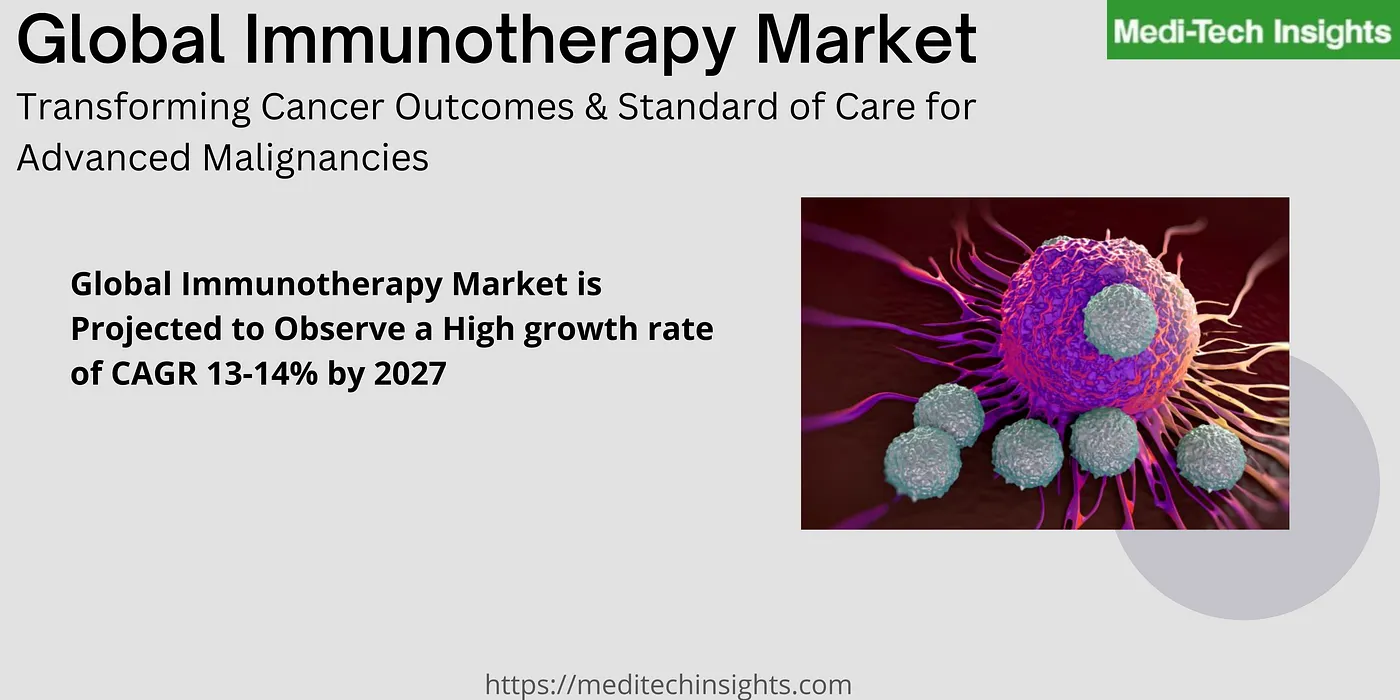Growing cases of cancer, the advent of innovative treatment techniques such as chimeric antigen receptor (CAR) T-cell therapy, cancer vaccines, adoptive cell transfer (ACT) therapy are some of the major factors driving the immunotherapy market. However, the high cost of immunotherapy and the availability of less expensive treatments such as chemotherapy are projected to stifle the growth of the immunotherapy industry.
Cancer Immunotherapy is a treatment that use the body’s immune system to combat cancer cells. It stimulates the immune system, causing it to recognize and fight cancer cells. The treatment either uses compounds produced by the body or substances created in a laboratory to detect and combat cancer cells. Immunotherapy can be used alone or in combination with chemotherapy or other cancer treatments to treat various forms of cancer.
Cancer Immunotherapy Market: Major Market Trends
Cancer immunotherapy is quickly progressing and is already licensed for the treatment of a variety of cancers. Cancer immunotherapy is crucial in immune system maintenance because it targets infectious organisms that may cause cancer through the creation of antibodies.
Leading Immunotherapy trends include the following:
- Combination Therapies: This methodology employs the use of multiple immunotherapeutic drugs in the treatment of cancer. Some therapies have shown promising outcomes in clinical trials and gaining popularity in the treatment of cancer. For instance, in April 2023, U.S. Food and Drug Administration (FDA) granted Astellas Pharma Inc. and Seagen Inc. accelerated approval for using PADCEV® with KEYTRUDA® as a combination therapy for the treatment of adult patients with locally advanced or metastatic urothelial cancer (la/mUC) in the United States. The indication is granted under accelerated approval based on tumor response rate and response durability, and for patients who are ineligible for cisplatin-containing treatment.
- Gene Editing: The advances in gene editing technology is facilitating the development of new immunotherapeutic drugs. For example, CRISPR-Cas9 has emerged as key therapeutic tool in cancer research and clinical trails
Major Growth Drivers of the Immunotherapy Market
The rising prevalence of cancer, an aging population, and lifestyle changes are some of the primary reasons driving the growth of the global immunotherapy market. The increasing number of clinical trials, as well as the increased efficacy and precision of new medicines with fewer side effects compared to established treatments such as chemotherapy, are likely to drive market expansion further. Other factors driving its growth in the global market include the government’s increasing investments in R&D and the introduction of new treatment techniques such as chimeric antigen receptor (CAR) T-cell therapy, cancer vaccines, and adoptive cell transfer (ACT) therapy. For instance,
- In February 2022, the Janssen Pharmaceutical Companies of Johnson & Johnson received approval from the U.S. Food and Drug Administration (FDA) for using CARVYKTI® (ciltacabtagene autoleucel; cilia-cel) for the treatment of adult patients with relapsed or refractory multiple myeloma (RRMM). This treatment will be provided to patients, who have received at least one prior line of therapy including a proteasome inhibitor, an immunomodulatory agent, and are refractory to lenalidomide
North America Projected to Continue to Hold a Large Share in the Global Immunotherapy Market
Geographically, North America holds a significant market share in the immunotherapy market. This can be primarily be attributed to the growing number of cancer patients, quick adoption of immunotherapy throughout U.S. oncology practices, the developed healthcare infrastructure, and the presence of major players in the region. However, the Asia-Pacific region is poised to witness strong growth in the future years, due to rising cases of cancer and the regions high geriatric population.
Competitive Landscape Analysis : Global Immunotherapy Market
Some of the leading players operating in the market include :
· Amgen Inc.
· Bayer AG
· Astellas Pharma Inc.
· AstraZeneca
· Bristol-Myers Squibb
· F. Hoffmann-La Roche
· Pfizer Inc.
· Eli Lily and Company
· Novartis AG,
· Johnson & Johnson (Janssen Global Services LLC)
· Merck and Co. Inc. among others.
Organic and Inorganic Growth Strategies Employed by Players to Garner a Foothold in the Immunotherapy Market
Companies operating in this market are adopting organic and inorganic growth strategies such as upgrading with new technology, New product launches, collaborations, and acquisitions to gain larger market share. For instance,
- In May 2023, Janssen Biotech, Inc., one of the Janssen Pharmaceutical Companies of Johnson & Johnson, entered into a worldwide collaboration and license agreement with Cellular Biomedicine Group Inc. (CBMG) for the development, manufacture, and commercialization of next-generation chimeric antigen receptor (CAR) T-cell therapies for the treatment of B-cell malignancies
The immunotherapy market is expected to gain further traction in the coming years due to the increasing adoption of new therapeutic treatments and combination therapies, favorable government support, rising investments in research and developments, and aggressive organic and inorganic growth strategies adopted by the players.
Get Detailed Insights on Global Immunotherapy Market with a Sample Report Copy/PDF @ https://meditechinsights.com/immunotherapy-market/
